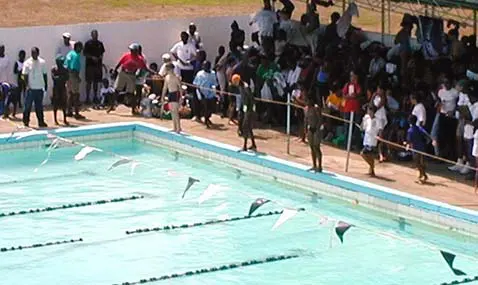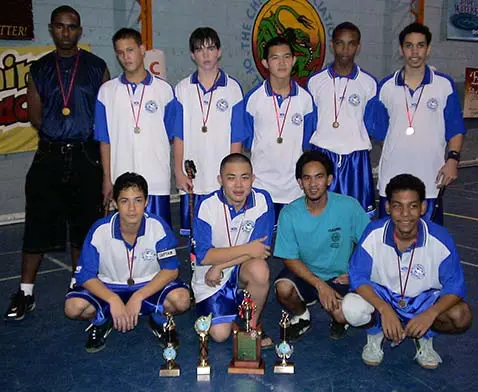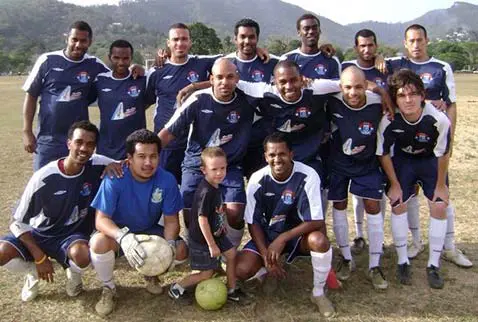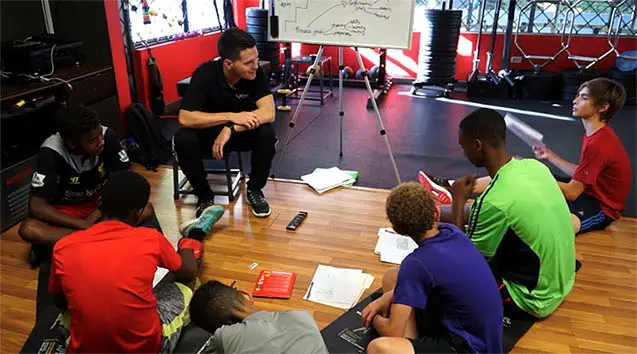RISE PERSPECTIVE
June 19, 2018
Leaders Play Key Role for Cultural Inclusion in Sports
By Kaimare "Kai" Laird

One question I'm always asked when someone meets me is, "Kai, where are you from?"
When I respond that I'm from Trinidad & Tobago, their look of genuine interest usually shifts to bewilderment.
Being a white male born and raised in the melting pot of Trinidad & Tobago was always a confusing notion for others to grasp immediately, especially if they didn't know where Trinidad & Tobago was on the world map. Because of my Chinese, European and Trinidadian ancestry, I identify myself as mixed ethnicity. Both of my parents and grandfathers were born in Europe, while my grandmothers were raised in Trinidad & Tobago.
Growing up in such a diverse family naturally I was taught from a young age to treat everyone equally and respectfully no matter from what race or culture they originated.
Even though I often was perceived as "not from Trinidad" by locals in my homeland and labeled as an immigrant in the United States because of my international origin, sports was one arena that I could feel accepted based on my ability instead of ethnicity. From my first sporting experience I believed that your ability and attitude as an athlete were the most important factors upon which one should be judged. Gradually as I progressed as an athlete I realized that race played a defining role in how an individual was received and judged within sports.

My first sporting experience occurred when I started swimming competitively at age 6 and on most occasions was the only Caucasian male competing in the race. Despite this I never was concerned or distracted because it was an individual sport and I considered myself responsible for how I performed. All I had to do was swim fast and touch the end of the wall before anyone else.
As I continued to grow, I found myself increasingly passionate about team sports and was offered an opportunity to join the Chinese Association Men's U-19 and Men's Senior Hockey Team. I was very excited about the opportunity to be a part of the team as most of my close cousins, who were Chinese, were on the same team, including my uncle, who was part of the coaching staff. Because of my mother being half Chinese, I was eligible to join the Chinese Hockey Club, making me the only Caucasian male on the team.
Despite being a first team player and experiencing a lot of collective success in the sport, at times I was subjected to racial remarks and often referred to as "white boy" by some of my teammates and opponents. It was never easy being singled out in the team, as it was the first time in my life that I felt different because of my race.
Gradually I became a key player on the men's team and was voted in as captain. As a leader on the team, I felt brave to finally stand up and speak my mind about any verbal discrimination that occurred. At this time, the team was composed of many races besides Chinese, so I wanted to be culturally sensitive to the other players and make sure that racism or discrimination wouldn't be accepted while I was captain.

When engaging my teammates I never used labels or made racial/cultural comments nor would I condone my teammates making any remarks that could be considered discriminatory. I remember one specific situation where I expressed to one of the veteran players that I didn't appreciate being referred to as "white boy" and even though his intention wasn't to bring me down, he acknowledged that he never realized how it negatively impacted me. Through this experience I learned how important it was for individuals in leadership positions to be culturally aware and sensitive when working with those of diverse ethnic backgrounds.
Besides my passion for hockey, I also fell in love with soccer while in high school, leading to me competing in various semi-pro teams in Florida, Illinois and Virginia while I completed my undergraduate and graduate studies.
While living in the United States, I learned quickly that even in a country where I appeared to be a part of the majority race, I still was classified as a minority because of my international origin and my rich Caribbean accent. Being an athlete in the United States was very different to what I had experienced back in Trinidad, as a majority of the soccer teams I competed on in the United States included several international athletes.

Because of the large international influence within the team, I quickly was welcomed into the group and always was able to focus specifically on improving and competing. Being easily accepted into the team by teammates was really important, as it was my first experience living away from Trinidad.
As more international guys joined the team, I began to realize that they were experiencing the same transition I had gone through when I first came to the United States. Knowing the impact that my international teammates had on me when I first moved to the United States, I began organizing weekly soccer pickup game and an intramural team so that incoming international students had opportunities to be included and feel welcomed.
As I continued progressing in soccer and represented several teams in Tampa, Chicago and Virginia Beach, my ethnicity was never mentioned. I believed that was because of the players' and coaches' cultural sensitivity as majority of the team was of mixed ethnicity like me. It was being a part of these diverse teams that I realized how much an individual's experience and perception within sports could be shaped or influenced by the team's diversity and leadership.

As sports participation continues to grow worldwide, it has become a melting pot made up of athletes who are increasingly diverse in culture and race. Unfortunately, athletes from minority populations may not always be welcomed or accepted by the dominant culture within sports.
What I have learned through my own experiences is that those in leadership positions can significantly impact a team's receptivity of minorities and improve cultural inclusion. We can assist an individual's adaptation in sports by being culturally sensitive through our communication and behavior while addressing any discriminatory behavior in an assertive manner.
Through meaningful discussions, encouragement and support we can continue to work toward improving cultural inclusion and reduce the likelihood of minorities being marginalized within sports.
Kaimare "Kai" Laird is a sport performance consultant, clinical counselor and soccer coach who was born and raised in Trinidad and Tobago, the southernmost isles of the Caribbean. Over the past six years, he has consulted with hundreds of collegiate athletes, teams, coaches, high schools, elite academies and professionals across the United States, assisting individuals and teams to achieve their desired level of performance and success. Laird collaborates with his team at The Performance Pursuit to provide integrated mental skills training services to athletes, coaches, professionals and exercisers in Illinois, Virginia and Trinidad & Tobago.





Our
Partners
Stay
In Touch
Follow us on social media.